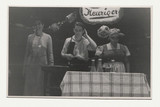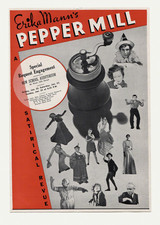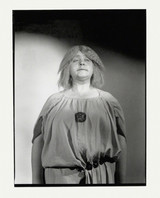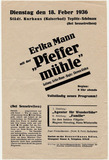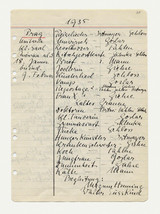Flyer for a protest rally against the Pfeffermühle (1934)
Flyer for a protest rally against the Pfeffermühle (1934)
Bei mir daheim im Lügenland / Darf keiner mehr die Wahrheit reden, – / Ein buntes Netz von Lügenfäden / Hält unser grosses Reich umspannt. // Bei uns ists hübsch, wir habens gut, / Wir dürfen unsre Feinde morden. / Verleihn uns selbst die höchsten Orden / Voll Lügenglanz und Lügenmut
[At my home in the Land of Lies / No-one may speak the truth, - / A colourful web of deceit / Holds our great empire together. // It's nice where we live, / We may kill our enemies. / We give ourselves the highest awards / Polished with mendacity and false courage (ed. trans.)]
Erika Mann, Der Prinz von Lügenland, 1934
Riots broke out during the November 1934 Pfeffermühle performances in Zurich. The third exile show, which had premiered a month before in Basel, had become significantly more barbed. In memory of Erich Mühsam, who had been murdered in July in the Oranienburg concentration camp, Erika Mann included his text Der Revoluzzer. The theme of the show was Lauter Märchen (Nothing but fairy tales). Erika Mann presented the show as a fairy tale writer. Numbers such as Erika Mann with a riding crop and black uniform boots as Der Prinz von Lügenland, or Igor Pahlen with a side parting and Hitler moustache as an executioner in Der Mann der Stunde left little room for doubt.
The reason for the National Front's protest in Zurich was the song performed by Therese Giehse about Hitler's power entitled Weil ich will but which the audience assumed to be about the nationalist Swiss Colonel Wille. This resulted in rallies, beatings and arrests. The performances could only be continued under police protection.
The remainder of the tour was marked by cancellations. Citing the rioting and the German clientele in the resorts, several cantons withdrew approval for the Pfeffermühle. It was not until the winter of 1935/36 that a final ten-week tour was staged in Switzerland.


